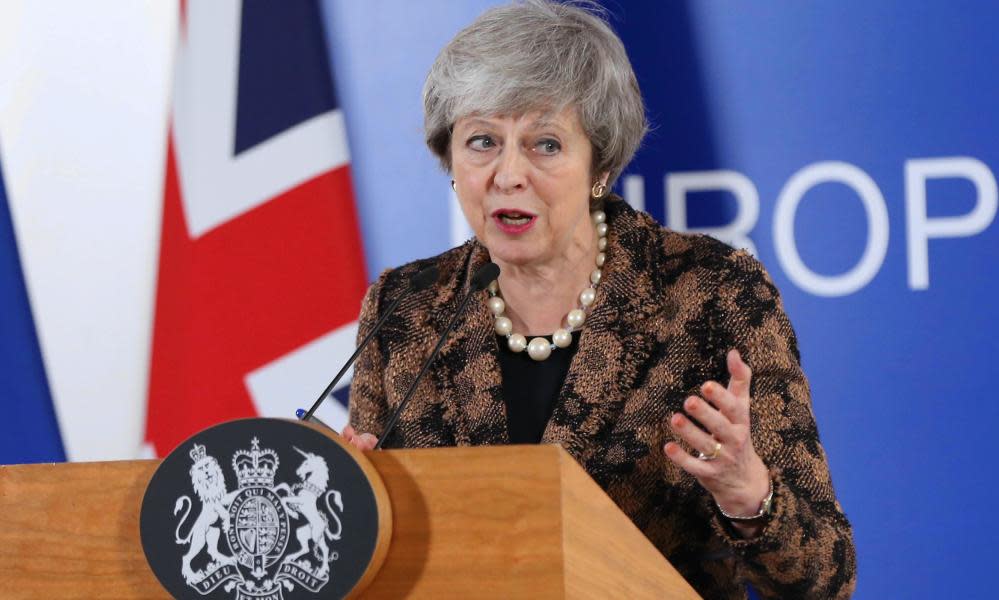Theresa May hits back at claims of 'nebulous' Brexit proposals

Theresa May has insisted that her plan to seek clarification from the EU to help get her Brexit deal through parliament is still on track, hours after an apparent row with Jean-Claude Juncker over whether her proposals were too “nebulous”.
The prime minister said she had been “crystal clear” with the European commission president and other EU leaders on Thursday night about the assurances she needed over the Irish backstop.
Giving a lunchtime press conference in Brussels amid an atmosphere of recrimination, May said her discussions with her EU colleagues “have shown further clarification and discussion is in fact possible” and that she would be holding further talks “in the coming days”.
May said she had had “a robust discussion” with Juncker on Friday morning, which was captured on film but without sound. Lip readers said a clearly angry May said: “What did you call me? You called me nebulous.”
A clearly defensive Juncker replied: “No I didn’t, no I didn’t.” But at a press conference held at midnight after a summit dinner he had complained that the UK’s Brexit position was “nebulous and imprecise” and demanded that May bring forward clear proposals for potential clarification.
May indicated that she had held an emergency round of diplomacy on Friday morning with Juncker, the EU council president, Donald Tusk, and others in an attempt to keep alive the idea of obtaining an additional clarification that would sit alongside the Brexit deal.
The UK hopes to secure a commitment that a free trade deal would commence no later than a year after the backstop comes into force – if it ever does – to make clear that it would be only a temporary customs arrangement to prevent a hard border in Ireland, although it is uncertain whether this commitment would have legal force.
May said Juncker “had been talking about a general level of debate” and that she “had further conversations with him through the morning”. She said more work had to be done on obtaining further assurances.
Jeremy Corbyn, the Labour leader, said May had “utterly failed in her attempts to deliver any meaningful changes to her botched deal” in her two-day visit to Brussels. He called on her to put the deal to a parliamentary vote next week.
Arlene Foster, the leader of the Democratic Unionist party, which is supposed to back May’s government, said the prime minister had “promised to get legally binding changes”. Foster said pushback from the EU was unsurprising, adding: “The key question is whether the PM will stand up to them or whether she will roll over as has happened previously.”
On Thursday night, it emerged the Irish prime minister, Leo Varadkar, had successfully persuaded the remaining EU leaders over dinner to remove a commitment from the summit’s Brexit conclusions to “stand ready to examine whether any further assurance" can be provided”.
May’s statement, however, suggests she believes she has a mandate to continue talking over further clarification on the backstop, but there remains concern from Ireland and France, while Germany and Austria, which holds the presidency, are sympathetic to the idea.
It is not clear that MPs would respond positively to a backstop clarification, prompting scepticism among EU leaders as to whether such a concession is worth making.
Steve Baker, a leading figure in the hard Brexit European Research Group, questioned whether May was an effective negotiator after some Brussels sources said she struggled to spell out precisely what she wanted before dinner.
“How can Theresa May stay in office if she cannot articulate what she wants for the UK when it really counts?” Baker said.

 Yahoo News
Yahoo News 
